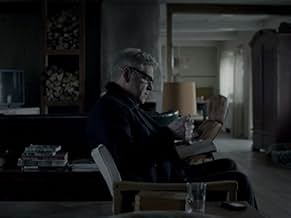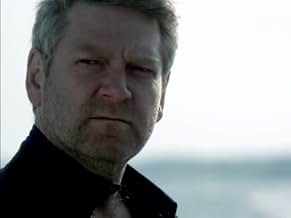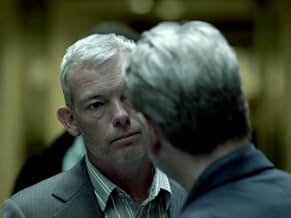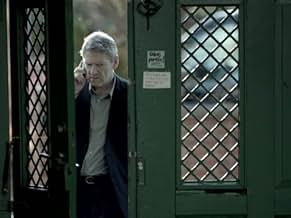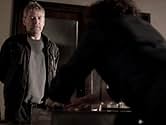Unable to unsee the dark crimes he's tasked to investigate, Wallander's job comes at a cost to his family and relationships.Unable to unsee the dark crimes he's tasked to investigate, Wallander's job comes at a cost to his family and relationships.Unable to unsee the dark crimes he's tasked to investigate, Wallander's job comes at a cost to his family and relationships.
- Nominated for 2 Primetime Emmys
- 12 wins & 31 nominations total
Browse episodes
Storyline
Did you know
- TriviaMost Swedish critics consider this the best movie or television adaptation of the Wallander canon, in particular because of Sir Kenneth Branagh's performance. The most prominent newspaper in southern Sweden (where the series was set and filmed) acknowledged this with an article whose title translates as "Wåll-and-ör- The Real Wallander" (the first part pokes fun at the way Wallander's name is pronounced in English).
- ConnectionsFeatured in Breakfast: Episode dated 7 June 2010 (2010)
Featured review
Watching two episodes of "Wallander" makes me think of Isabelle Huppert's line in Hal Hartley's great "Amateur": "everything I write comes out sad. Why do you think that is?" Kenneth Brannagh's shambling, weary detective Kurt Wallander is as far from TV's 'Columbo' as it's possible to get, despite certain physical similarities.
In a way that I seem to recognise as uniquely Nordic, Wallander goes about his daily business – solving murders – with a residual sadness on him and his world, and everything in the show – from the art-house photography and pared-down sets, to the score, to his life and to each episode's stories themselves – helps create a consistent portrait, so that by the time I settled down for episode two, Wallander's appearance was an automatic trigger to a certain state of mind.
Each classy episode takes its time, draws visual comparisons, sets Wallander up in his world, makes you know him better. I'm loving it : it's on a par with the excellent French TV thriller "Engrenages" that previously appeared on BBC4, and anything ever so slightly formulaic about the story lines in each episode is offset by the serious and committed acting, the well-drawn characterisation, the consistent visual tone. I'm so glad they avoided the Meryl Streep world of accents and wholesale removal of the drama to the UK (or USA). These are Swedish characters in a Swedish town who write in Swedish – it's just that we're hearing them in English. And this technique allows them to cast truly excellent English supporting actors without any fear of uneven accents or geographic transitions that don't work so well. (No English forest ever looks quite like a Scandinavian one. And the British don't so much do sadness and mournful humour, as bleakness and black humour – they're quite different.)
I saw Kenneth Brannagh as an electrifying 'Hamlet' on stage in the late 80s, and this feels something like being reacquainted with an old ghost. He's no longer young, and he's not beautiful, but he makes masterful use of his eyes, his voice, the very weariness life has given him – to create a memorable man, not just a cartoon portrait. Highly recommended.
In a way that I seem to recognise as uniquely Nordic, Wallander goes about his daily business – solving murders – with a residual sadness on him and his world, and everything in the show – from the art-house photography and pared-down sets, to the score, to his life and to each episode's stories themselves – helps create a consistent portrait, so that by the time I settled down for episode two, Wallander's appearance was an automatic trigger to a certain state of mind.
Each classy episode takes its time, draws visual comparisons, sets Wallander up in his world, makes you know him better. I'm loving it : it's on a par with the excellent French TV thriller "Engrenages" that previously appeared on BBC4, and anything ever so slightly formulaic about the story lines in each episode is offset by the serious and committed acting, the well-drawn characterisation, the consistent visual tone. I'm so glad they avoided the Meryl Streep world of accents and wholesale removal of the drama to the UK (or USA). These are Swedish characters in a Swedish town who write in Swedish – it's just that we're hearing them in English. And this technique allows them to cast truly excellent English supporting actors without any fear of uneven accents or geographic transitions that don't work so well. (No English forest ever looks quite like a Scandinavian one. And the British don't so much do sadness and mournful humour, as bleakness and black humour – they're quite different.)
I saw Kenneth Brannagh as an electrifying 'Hamlet' on stage in the late 80s, and this feels something like being reacquainted with an old ghost. He's no longer young, and he's not beautiful, but he makes masterful use of his eyes, his voice, the very weariness life has given him – to create a memorable man, not just a cartoon portrait. Highly recommended.
Details
Contribute to this page
Suggest an edit or add missing content








